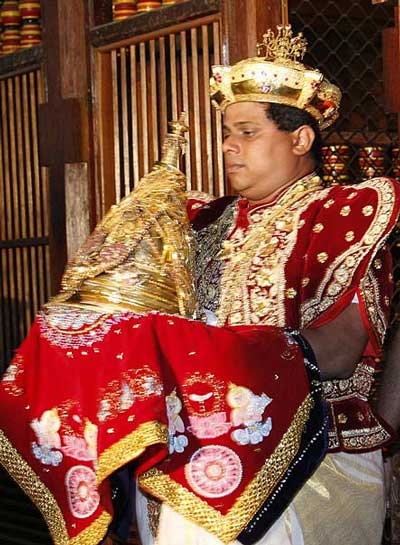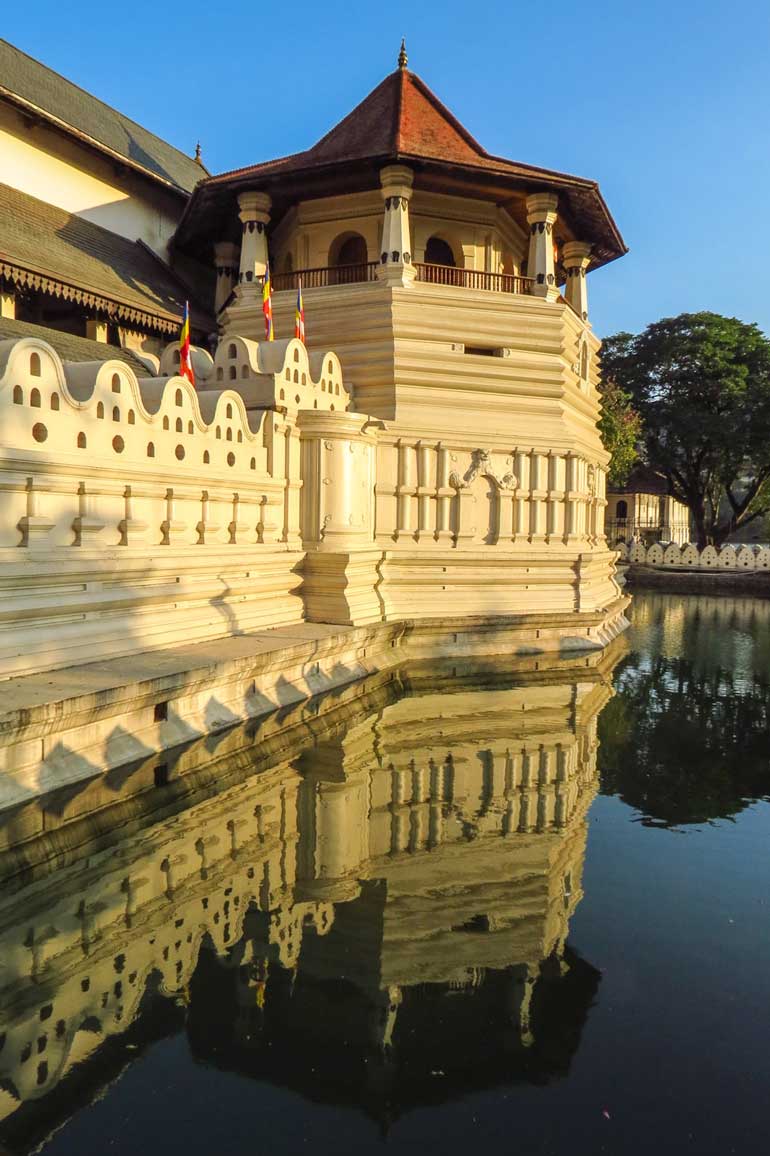Friday Feb 20, 2026
Friday Feb 20, 2026
Saturday, 5 September 2015 00:00 - - {{hitsCtrl.values.hits}}

Diyawadana Nilame Pradeep Nilanga Dela participating in the Esala Perahera last week
By D.C. Ranatunga
Just a week after the Esala Perahera, all eyes will be on Kandy once again. There will be a lot of interest in who is going to become the next Diyawadana Nilame (DN), the high-ranking position as the lay custodian of the Sri Dalada.
The election is to be held on Tuesday, 8 September. The names of the present incumbent Pradeep Nilanga Dela, former DN Neranjan Wijeratne and Sri Natha Devale Basnayaka Nilame Gayan Heenkenda and a former Basnayaka Nilame Sudantha Senanayaka are mentioned as the main contenders.
The Diyawadana Nilame is not only the lay custodian of the Tooth Relic but is also the CEO of the Maligawa. He is elected by an electorate comprising the Mahanayaka Theras of the Malwatta and Asgiriya Chapters, trustees of Buddhist temples in the Kandyan areas with an annual income of Rs. 1,000 and registered with the Public Trustee, and the Assistant Government Agents (earlier known as Divisional Revenue Officers – DRO) also in the Kandyan areas. These officers have to be Buddhists and only males are eligible to vote. The election is conducted under provisions made in Act 19 of 1931.
Once elected the Diyawadana Nilame holds the position for 10 years and can run for a second term. The present DN has only completed one term while the former DN Wijeratne served two terms. He is contesting again this time after a break of one term.

An official in the royal household
The Diyawadana Nilame was an official in the royal household during the days of the Kandyan king. He was one of three officials who attended to the royalty’s daily needs. Known as ‘Diva Nilame’, one official’s main task was to ensure that facilities for the king to bathe were in place. He also had to pour water from a gold jug for the king to wash his hands before having his meals.
Similar functions were performed by two other officials too. One was in charge of bathing facilities of the queens and princes and the other had to ensure that when the king visited the Dalada Maligawa there was water for the king to wash his hands prior to worshipping the Relic and also purest water was available for offering during the Buddha Pooja.
At the time the British took over the Kandyan kingdom in 1815, only one official functioned as the Diyawadana Nilame. He was chosen from a Kandyan aristocratic family and continued until his death. It was his responsibility to see that the traditional customs in respect of the Tooth Relic were continued in the same fashion and that the property belonging to the Dalada Maligawa was taken care of.
He detailed the staff for the different activities and ensured that the many families performed the assigned tasks under the ‘rajakariya’ system. Under the ‘rajakariya’, the king gave them lands for them to occupy and cultivate. In return they had to perform certain tasks. Most of the services were related to the annual Esala Perahera. The dancers and drummers who performed in the Perahera occupied such land.
In 1853, the custody of the Tooth Relic and managing the tasks connected with the Tooth Relic was transferred to the Mahanayaka Theras of Malwatta and Asgiriya and the Diyawadana Nilame. As the lay custodian, the DN has a key to open the relic casket – a task for which the two Mahanayaka Theras and the DN should be present.
Complex duties and responsibilities
As the years passed, the DN’s duties and responsibilities have become quite complex. Organising the Perahera itself has become a tough operation.
The participation of elephants is a key element in the Perahera. To find he required numbers, however, is increasingly becoming a difficult task. Numbers are dwindling and the Maligawa officials have to keep looking for sources to get them down. They have to be transported from distant places and fed and cared for over a period of over two weeks. The elaborate costumes for the elephants too have become an expensive item. Often individuals and firms gift costumes, yet with increasing costs, not many come forward.
Even the dancers and drummers are ‘a rare commodity’. There was a time when it was so prestigious to perform in the Perahera. Renowned dancer Nittawella Guaya Gurunnanse, for instance, was a regular at the Perahera. For him it was an honour. Though some families are expected to carry forward the tradition, not all youngsters are interested. In a society fast becoming commercial, they prefer to look for more lucrative sources. The dancers and drummers are also provided with meals and costumes.
Copra is used in large quantities to light the torches carried during the Perahera. This has become an expensive item. The DN has to find sufficient funds to conduct the Perahera which is the old days conducted with the participation of those who did ‘rajakariya’ to the Maligawa.
In addition to the annual Perahera, at least four festivals have to be organised during the year. The DN also has to arrange residential facilities for the monks who conduct the daily offerings to the Sri Dalada and to see to their comforts. A trained staff is necessary to prepare alms to the Tooth Relic following traditional recipes, to arrange the offerings in the stipulated format, to bring them to the Relic chamber at the given times, and to clean up once the offerings are over. Many more are the activities within and outside the Maligawa which have to be planned, executed and supervised by the DN.
Although the Maligawa possesses properties, they have to be managed properly. The onus falls on the DN to manage them, maintain accounts and be answerable to the authorities.
True, the post of Diyawadana Nilame is prestigious, dignified and glamorous. Along with it goes the major responsibility of managing the affairs of the most treasured Buddhist temple efficiently and professionally.